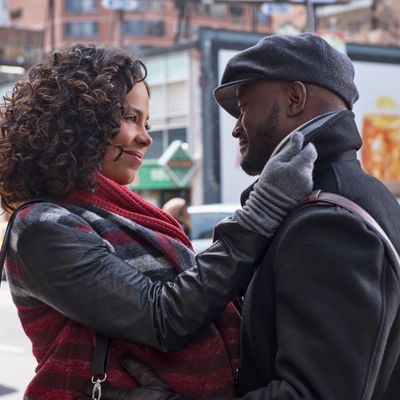
Back in 1999, Malcolm D. Lee’s The Best Man was a winning, sensitive ensemble comedy that showcased the talents of some of our best black actors. It didn’t make boatloads of money, but it did pretty well, proving yet again that there was real opportunity — both financial and artistic — in going after a midmarket African-American audience. Since then, of course, with more flamboyant (and, let’s just say it, less accomplished) movies from folks like Tyler Perry crowding the marketplace, The Best Man feels like the product of a bygone era. It was soft and fuzzy, but it also had a certain unvarnished honesty, a surprising intimacy that lent credibility to the characters’ forthright discussions about relationships and sex.
For The Best Man Holiday, the characters are back, albeit at later stages in their lives. Harper (Taye Diggs) is no longer a young author with a hot new novel but a guy whose books have stopped selling; meanwhile, his wife Robyn (Sanaa Lathan) is pregnant with their first child. Talented athlete Lance (Morris Chestnut) is now at the end of a storied NFL career, about to retire to spend more time with his lovely wife Mia (Monica Calhoun) and their gaggle of kids. Jordan (Nia Long), whom Harper was once madly in love with, is a high-powered executive at MSNBC (with a cool and somewhat Don Draper–like white boyfriend, played by Eddie Cibrian). There’s also committed single Quentin (Terence Howard), and straitlaced Julian (Harold Perrineau), who married former stripper Candace (Regina Hall) and started a school.
Anyway, the gang’s all here — but they’re not really doing anything. The Best Man Holiday feels more like an accessory than a sequel. This time, instead of a wedding, we’ve got a holiday reception at Lance’s immense mansion. That’s as good an excuse as any to get them all together in the same place again, but the years have made them a bit less interesting, a bit less distinct. The mild little nuggets of plot — Harper wants to convince Lance to let him co-write his autobiography — don’t do much to carry us along. The reverential intros are still here: The characters often show up, accompanied by smooth pop music and smiles. But while they felt like a fun, generous bit of stylization in the original, here they feel overbaked. Similarly, in the earlier film, each character ably represented a different philosophy of love and relationships: Lance was the womanizer transformed by the love of a good woman; Harper was the agitated romantic for whom everything had to be perfect; Quentin was the unrepentant dawg; etc. But there’s a thin line between an archetype and a cliché, and The Best Man Holiday is not as successful as its predecessor about not crossing it.
Still, the actors continue to have an ease around each other that sells some of the film’s sillier bits. A conversation about blow jobs doesn’t quite feel as candid as it might have in the first film, but it still has its own energy — in part because we buy the idea that these people have known each other for years. The Best Man Holiday eventually does go to some surprisingly dark places — to say more would definitely constitute a spoiler — and the final act of the film is a mixed bag. It’s hard not to feel like we’re being manipulated, but even here, there are occasional moments of honesty, sold mainly by the actors’ understated delivery and patience, and by the fact that director Lee knows not to get in the way. The Best Man Holiday is an inelegant movie, but its cast is so damn likable that we’re still willing to follow them — even when they’re not going anywhere.


